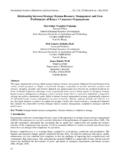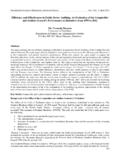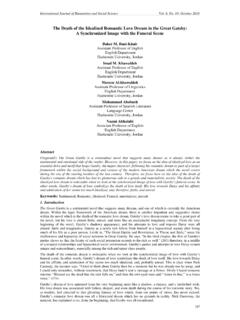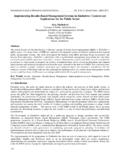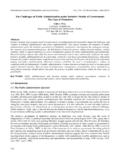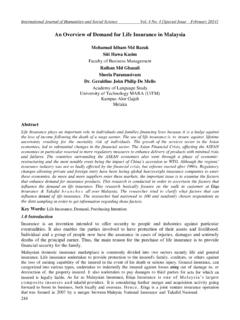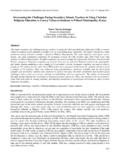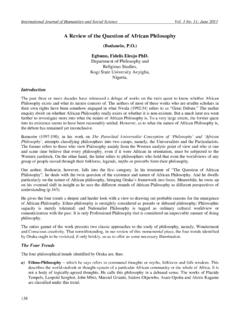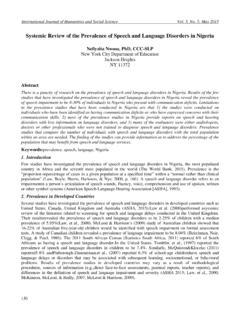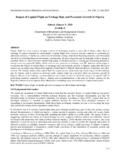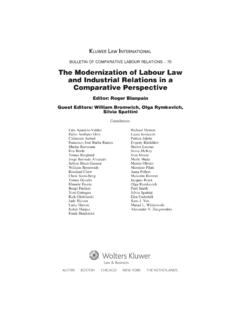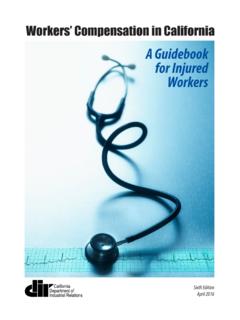Transcription of Emerging Trends in Labour Law and Industrial Relations in ...
1 International Journal of Humanities and Social Science Vol. 4, No. 11(1); September 2014 29 Emerging Trends in Labour Law and Industrial Relations in nigeria Dr. Ahmed Associate Professor Department of Private & Commercial Law Faculty of Law Bayero University Kano, nigeria Abubakar Aminu Ahmad and Nuhu Musa Idris Lecturers Department of Private & Commercial Law Faculty of Law Bayero University Kano, nigeria Abstract Labour law seeks to regulate the relationship between an employer or a class of employers and their workmen. The Labour market involves interplay of individuals and institutions engaged in the mobilization of the workforce for the production and distribution of goods and services and efficiency in the production processes.
2 The relationships in the Labour market, whether at individual or collective levels, are basically contractual in nature. The areas of concern to labor law include formation of the contract of employment, the terms of the contract, including the express and implied obligations of the parties to it as well as termination of the contract and the available remedies thereof. Other areas are largely concerned with the regulatory intervention of the state and they include health, safety and welfare at work, compensation for death, injury, disease or disability arising out of or in the course of employment, pension scheme, health insurance scheme, organised Labour relationship, including formation of trade unions, collective bargaining, Industrial disputes and actions as well as the institutional framework for the resolution of Industrial disputes.
3 The reach of this law is so wide that it touches the lives of millions of men and women who constitute the Labour force. The relationship between labor and management is based on a mutual adjustment of interests and goals. It depends upon economic, social and psychological satisfaction of the parties; the higher the satisfaction, the healthier the relationship. In practice, it is however found that Labour and capital constantly strive to maximize their pretended values, and by so doing they try to augment their main respective incomes and improve their positions. These create sharply divided and vociferously pressed rival claims, which is not always easy to amenable reconciliation.
4 The state with its ever increasing interest in Labour and welfare issues cannot remain silent and helpless spectator in the relationship. So it takes the responsibility of coming up with legislative provisions meant to balance these conflicting interests in the arena of Labour management Relations . The paper examines the relevant legislations such as the Pension Reform Act 2004, the Trade Unions (Amendment) Act 2005, the National Industrial Court Act 2006, the Employees Compensation Act 2010 and the Constitution (Third Alteration) Act, 2010. The judicial decisions on the development of Labour law and Industrial Relations in nigeria have been reflected in the examination.
5 The paper concludes that there have been efforts in nigeria to conform to international Labour standards through some of the legislations passed recently, particularly the National Industrial Court Act, 2006 and the Constitution (Third Alteration) Act, 2010. The paper further makes some recommendations that involve the need for the review of the constitution and some of the Labour legislations to improve respect for and realisation of the international best practice on Labour and Industrial Relations in the country. Center for Promoting Ideas, USA 30 Introduction Various Phrases1 like the one used in the title of this paper - Labour Law and Industrial Relations - are used to refer to the framework of the legal Relations involved in the employer and employee relationship.
6 Under the relationship, the employee provides dependent or subordinate Labour for the employer and receives wages in exchange as opposed to independent Labour provided by a self-employed or an independent contractor under the principal and independent contractor relationship. The employer and employee relationship is distinguished from any other similar relationship, including agency, bailment and partnership relationships based on the civil law distinction between contract of employment or contract of service which is used to be known, and still referred to in nigeria , as Master and Servant Contract on the one hand and contract for services or contract of commission or trust on the The Labour market in the sense of the employer and employee relationship constitutes interplay of individuals and institutions engaged in the mobilization of dependent or sub-ordinate workforce for the production of goods and services and efficiency in the production processes.
7 The market is a network of Relations at both individual and collective levels and Labour Law (or Labour Law and Industrial Relations as used in the title of this paper) is concerned with regulation of the Relations in the market. Labour Law is very dynamic and composite in nature Emerging from principles of common law and codified and modified from time to time by legislations and having both private and public law flavours as it cuts across the law of contract, law of torts, constitutional and administrative law etc. The idea of global Labour standards has increasingly made domestic Labour law to bear international dimensions.
8 Besides pervading various areas of law, Labor Law can be said to be both multidisciplinary and interdisciplinary subjects as it relates to almost all areas of study and in particular it straddles the frontiers of human resource management, economics, sociology, psychology, medicine, politics and international Relations among others3. Looking at the literatures on Labour law across jurisdictions4, Labour law as a distinct legal discipline is broad and most importantly classified into two related components, the Individual Labour Law and the Collective Labour Law5. Individual Labour Law is a body of rules concerned with the individual relationship between employers and employees and covers such areas of Labour Law as: (i)the different categories of employees like the blue-collar and white-collar employees, the private sector and public sector employees, the regular and temporary employees, employees on probation, employees with two employers; vulnerable groups including children and young persons, apprentices, women, aged, physically challenged and persons suffering from stigmatised health conditions such as HIV/AIDS.
9 (ii)the individual contract of employment: form and content, the legal capacity to conclude the contract, termination of the contract and available remedies for wrongful termination of the contract;(iii)the implied rights and duties of parties in employment relationship;(iv)working time, rest, holidays, annual vacation and so on;(v)remuneration;(vi)the rules concerning incapacity to work: due to illness, an accident at work, election to a full-time union post and so on;(vii)job security;(viii)protection against discrimination; (ix)competition by former employees;(x)inventions by employees and(xi)individual disputes and their settlement etc.
10 Collective Labour Law, on the other hand, is concerned with the aspects of the Labour law such as:(i)freedom to form or belong to a trade union or the right to organise; (ii)relationship between trade unions and employers or their associations at plant, enterprise, Industrial as well as at local and national levels;(iii)collective bargaining;(iv) Industrial actions including picketing, strikes and lockouts;(v)collective Industrial disputes;(vi)settlement of collective Industrial disputes and (vii)the protection of essential needs etc6. 1 Such as: Employment and Labour Relations Law , Employment and Industrial Relations Law or simply Labour Law etc.
